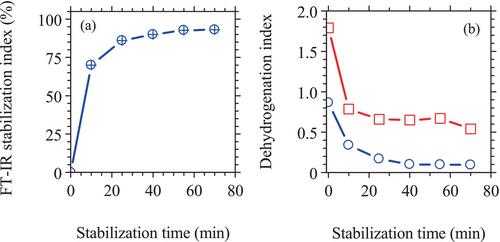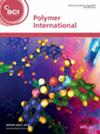下载PDF
{"title":"Multi-step heating strategy during thermal stabilization of polyacrylonitrile multi-filament bundle before carbonization","authors":"Hiba Hariri, Kemal Şahin Tunçel, Ismail Karacan","doi":"10.1002/pi.6665","DOIUrl":null,"url":null,"abstract":"<p>A polyacrylonitrile (PAN) multi-filament bundle underwent a multi-step heat treatment following impregnation with a solution of ammonium bromide, phosphoric acid and urea (A-P-U). The multi-step thermal stabilization process was conducted in an air atmosphere at temperatures ranging from 200 to 245 °C for various stabilization times spanning from 10 to 70 min. Comprehensive analysis of physical and mechanical properties, infrared (IR) spectroscopy, X-ray diffraction (XRD) and thermal analysis (DSC and TGA) revealed the significant influence of stabilization time on the structure and properties of thermally stabilized PAN multi-filament bundle. The fiber thickness and linear density of the stabilized fibers decreased by approximately 29.5% and 10.6%, respectively, after 70 min of heat treatment. However, the fiber density value increased from 1.18 to 1.38 g cm<sup>−3</sup> during the same stabilization time. Additionally, the carbon yield value obtained using TGA increased from 31% to 73% at 850 °C. The presence of A-P-U markedly reduced the time needed for the conversion of the PAN polymer into a cyclized structure through its nitrile groups, thereby accelerating the stabilization reactions. Furthermore, the IR spectra exhibited the appearance of CC bonds, signaling the creation of a crosslinked ladder-like structure. The XRD traces confirmed the decrease in crystallinity with increasing stabilization time, consistent with the findings from IR spectra. The findings showed that the A-P-U integrated system is notably successful and proficient in promoting the cyclization of nitrile groups, thereby decreasing the time needed to establish a thermally stable structure capable of withstanding elevated carbonization temperatures. © 2024 The Author(s). <i>Polymer International</i> published by John Wiley & Sons Ltd on behalf of Society of Chemical Industry.</p>","PeriodicalId":20404,"journal":{"name":"Polymer International","volume":"73 10","pages":"824-832"},"PeriodicalIF":3.6000,"publicationDate":"2024-05-24","publicationTypes":"Journal Article","fieldsOfStudy":null,"isOpenAccess":false,"openAccessPdf":"https://onlinelibrary.wiley.com/doi/epdf/10.1002/pi.6665","citationCount":"0","resultStr":null,"platform":"Semanticscholar","paperid":null,"PeriodicalName":"Polymer International","FirstCategoryId":"92","ListUrlMain":"https://scijournals.onlinelibrary.wiley.com/doi/10.1002/pi.6665","RegionNum":4,"RegionCategory":"化学","ArticlePicture":[],"TitleCN":null,"AbstractTextCN":null,"PMCID":null,"EPubDate":"","PubModel":"","JCR":"Q2","JCRName":"POLYMER SCIENCE","Score":null,"Total":0}
引用次数: 0
引用
批量引用
Abstract
A polyacrylonitrile (PAN) multi-filament bundle underwent a multi-step heat treatment following impregnation with a solution of ammonium bromide, phosphoric acid and urea (A-P-U). The multi-step thermal stabilization process was conducted in an air atmosphere at temperatures ranging from 200 to 245 °C for various stabilization times spanning from 10 to 70 min. Comprehensive analysis of physical and mechanical properties, infrared (IR) spectroscopy, X-ray diffraction (XRD) and thermal analysis (DSC and TGA) revealed the significant influence of stabilization time on the structure and properties of thermally stabilized PAN multi-filament bundle. The fiber thickness and linear density of the stabilized fibers decreased by approximately 29.5% and 10.6%, respectively, after 70 min of heat treatment. However, the fiber density value increased from 1.18 to 1.38 g cm−3 during the same stabilization time. Additionally, the carbon yield value obtained using TGA increased from 31% to 73% at 850 °C. The presence of A-P-U markedly reduced the time needed for the conversion of the PAN polymer into a cyclized structure through its nitrile groups, thereby accelerating the stabilization reactions. Furthermore, the IR spectra exhibited the appearance of CC bonds, signaling the creation of a crosslinked ladder-like structure. The XRD traces confirmed the decrease in crystallinity with increasing stabilization time, consistent with the findings from IR spectra. The findings showed that the A-P-U integrated system is notably successful and proficient in promoting the cyclization of nitrile groups, thereby decreasing the time needed to establish a thermally stable structure capable of withstanding elevated carbonization temperatures. © 2024 The Author(s). Polymer International published by John Wiley & Sons Ltd on behalf of Society of Chemical Industry.
聚丙烯腈多丝束碳化前热稳定过程中的多步加热策略
聚丙烯腈(PAN)多丝束在浸渍了溴化铵、磷酸和尿素(A-P-U)溶液后进行了多步热处理。多步热稳定过程在空气环境中进行,温度范围为 200 至 245 ℃,稳定时间范围为 10 至 70 分钟。对物理和机械性能、红外光谱、X 射线衍射和热分析(DSC 和 TGA)的综合分析表明,稳定时间对热稳定 PAN 多丝束的结构和性能有显著影响。热处理 70 分钟后,稳定纤维的纤维厚度和线密度分别下降了约 29.5% 和 10.6%。然而,在相同的稳定时间内,纤维密度值从 1.18 g cm-3 增加到 1.38 g cm-3。此外,在 850 °C 时,使用 TGA 获得的碳屈服值从 31% 增加到 73%。A-P-U 的存在明显缩短了 PAN 聚合物通过其腈基转化为环化结构所需的时间,从而加速了稳定化反应。此外,红外光谱显示出现了 CC 键,标志着交联阶梯状结构的形成。XRD 图谱证实,随着稳定时间的延长,结晶度会降低,这与红外光谱的发现一致。研究结果表明,A-P-U 集成系统在促进腈基环化方面非常成功和熟练,从而缩短了建立能够承受较高碳化温度的热稳定结构所需的时间。© 2024 作者姓名国际聚合物》由 John Wiley & Sons Ltd 代表化学工业协会出版。
本文章由计算机程序翻译,如有差异,请以英文原文为准。




